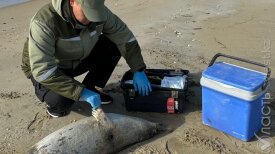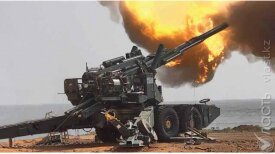After months of courting from Russia and China, Kazakhstan seems to have put a potential membership in the BRICS group on the back burner, according to President Kassym-Jomart Tokayev’s spokesperson Berik Uali. In an interview on October 16, Uali said Kazakhstan will not in the foreseeable future apply to become a member of the group, which includes Brazil, Russia, India, China, South Africa, Iran, Egypt, Ethiopia, and the United Arab Emirates, but will continue to attend its meetings.
Russia halted imports of grain from Kazakhstan, its agricultural regulator said on October 17. There have been tensions regarding allegedly pest-infested grain supplies in recent weeks, leading to a diplomatic spat. Kazakhstan is still allowed to use Russia’s transport network to export grain to third countries, the Moscow-based Rosselkhoznadzor said. On October 16, during a visit to Bishkek, Aidarbek Saparov, the minister of Agriculture, said that Kazakhstan would export grain to neighboring Kyrgyzstan. The Russian government also imposed restrictions on other agricultural imports from Kazakhstan, such as fruits and vegetables.
The International Monetary Fund wrapped up its mission to Kazakhstan suggesting that the government pushes forward with fiscal reforms. Kazakhstan has struggled to increase budget revenues to match its growing expenditures and has often relied on transfers from the National Fund to plug the budget hole. Nicolas Blanchet, the IMF head of mission, told the press on October 16 referring to National Fund transfers that “some operations are completely unexpected”. The day before, Nurlan Baibazarov, the minister of economy, said that budget revenue streams should stabilize in the next two or three years.
The international consortium operating the offshore Kashagan oil and gas field rebuked plans to build additional gas processing facilities voiced by Qazaqgas, the country’s gas transit monopolist. S&P Global reported on October 14 that the consortium would rather see Qazaqgas complete construction work at the facilities that were already planned, but lag behind schedule. Gas processing facilities, tied to oil production, could lead to an increased output, Qazaqgas’ CEO Sanzhar Zharkeshov said in September.
Iraq has asked Kazakhstan’s government to establish a gas supply agreement to make up for its domestic deficit, an Iraqi MP said on October 16. According to S&P Global, there would be an emergency tender for 150,000 tons of gasoil that Iraq plans to buy. Kazakhstan’s gas balance is constrained by growing domestic demands, but lower exports to China last year could mean that the country could direct some of its commercial gas to Iraq.
The National Competition Agency said on October 18 that it would lift the cap on gasoline prices. The agency noted that 80% of the market is state-controlled and the goal is to further de-regulate the sector. The day before, state news agency Kazinform said there was a fuel deficit across the West Kazakhstan region, something that routinely plagues certain regions in the country.
Unknown people set ablaze on October 12 the family home of Sherzat Bolat, the teenager that was killed a week earlier in Talgar, not far from Almaty. On October 4, a customer at Bolat’s family corner store killed the 16-year-old boy with a knife. Police later detained seven suspects. Videos of the attack emerged online and the prosecutor has already set up an investigative task force. On October 18, Tokayev fired the head of the local administration and reprimanded two of his colleagues.
A court in Astana sentenced on October 18 Daniyar Adilbekov, a journalist, to 4.5 years in prison for having disseminated false information. Adilbekov had reported on an alleged scheme regarding petroleum product supplies tied to a member of the government.
Поддержите журналистику, которой доверяют.








